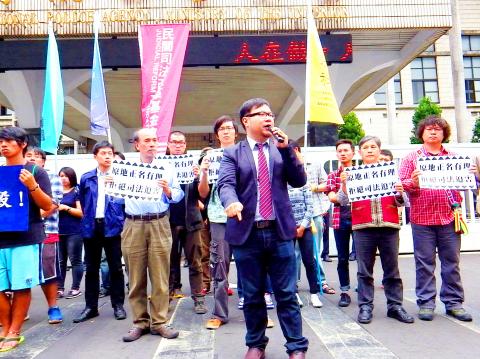Aboriginal and civic groups yesterday accused the government of conducting a “political witch hunt” with its pursuit of activists who spray-painted the Guangfu Township (光復) Office building in Hualien County to demand the restoration of Aboriginal names to tribal areas.
Early on Oct. 19, the Fa-Ta Alliance for Attack and Defense (馬太攻守聯盟), an Aboriginal group with members from the local Fataan and Tafalong communities in Hualien, painted graffiti on the facade of the office reading: “The land is the eternal nation” and “Whose restoration [(光復, guangfu)]? Names [of places] should be left to the master of the land,” along with the Aboriginal names of the two tribes.
Guangfu literally means “glorious restoration” or “glorious retrocession,” and is used by the Chinese Nationalist Party (KMT) regime to refer to the takeover of Taiwan from the Japanese after World War II.

Photo courtesy of the Association for Taiwan Indigenous Peoples’ Policy
However, the Association for Taiwan Indigenous People’s Policy that organized yesterday’s rally said that local police and prosecutors have since that day been harassing members of the alliance, their supporters and other Aborigines with telephone calls and verbal threats, causing great stress to their families and friends.
The association and more than half a dozen civic groups at the protest in front of the National Police Agency office in Taipei accused the government of “state violence.”
Chen I-chen (陳以箴), an Aboriginal rights advocate from the Makatao community who participated in the spray-painting protest, apologized to her people for “failing to tear down the township office’s name plaque all together.”
Association executive chief Yapasuyongu Akuyana said that giving places their rightful Aboriginal names is a “duty” of the state, not a “favor.”
“Rectification of names of traditional Aboriginal regions is the first step toward transitional justice for Taiwanese Aborigines,” Yapasuyongu Akuyana said.
“The spray-painting action is not an individual case; it is a product of history, an action by Aborigines in pursuit of self-identity and to right their names in history,” association president Oto Micyang said.
Echoing Omi Wilang, secretary-general of the Indigenous Peoples’ Action Coalition Taiwan, who said that the name Guangfu was assigned to the town without a full discussion with local Aborigines, Restoration of Taiwan Social Justice (臺左維新) chief executive Lin Yu-lun (林于倫) called the protest “an act of cleansing, rather than vandalizing; to clean off the pollution generated by 60 years of state colonization.”
Taiwan Referendum Alliance convener Tsay Ting-kuei (蔡丁貴) “confessed his sins” at the news conference, saying that as a non-Aboriginal Taiwanese, he is “an accomplice to the crime if name rectification is considered one.”
He added that in Canada, Aborigines are referred to as First Nations and Taiwan has from the outset belonged to Aborigines.
“This is not a crime of vandalism, but one of state officials’ dereliction of duty, for the Republic of China officials have failed to abide by the Indigenous Peoples Basic Act (原住民基本法),” he said.
Article 11 of the law stipulates that the government “shall restore the traditional names of indigenous tribes, rivers and mountains in indigenous peoples’ regions in accordance with the will of indigenous peoples.”

The US government has signed defense cooperation agreements with Japan and the Philippines to boost the deterrence capabilities of countries in the first island chain, a report by the National Security Bureau (NSB) showed. The main countries on the first island chain include the two nations and Taiwan. The bureau is to present the report at a meeting of the legislature’s Foreign Affairs and National Defense Committee tomorrow. The US military has deployed Typhon missile systems to Japan’s Yamaguchi Prefecture and Zambales province in the Philippines during their joint military exercises. It has also installed NMESIS anti-ship systems in Japan’s Okinawa

‘WIN-WIN’: The Philippines, and central and eastern European countries are important potential drone cooperation partners, Minister of Foreign Affairs Lin Chia-lung said Minister of Foreign Affairs Lin Chia-lung (林佳龍) in an interview published yesterday confirmed that there are joint ventures between Taiwan and Poland in the drone industry. Lin made the remark in an exclusive interview with the Chinese-language Liberty Times (the Taipei Times’ sister paper). The government-backed Taiwan Excellence Drone International Business Opportunities Alliance and the Polish Chamber of Unmanned Systems on Wednesday last week signed a memorandum of understanding in Poland to develop a “non-China” supply chain for drones and work together on key technologies. Asked if Taiwan prioritized Poland among central and eastern European countries in drone collaboration, Lin

NO CONFIDENCE MOTION? The premier said that being toppled by the legislature for defending the Constitution would be a democratic badge of honor for him Premier Cho Jung-tai (卓榮泰) yesterday announced that the Cabinet would not countersign the amendments to the local revenue-sharing law passed by the Legislative Yuan last month. Cho said the decision not to countersign the amendments to the Act Governing the Allocation of Government Revenues and Expenditures (財政收支劃分法) was made in accordance with the Constitution. “The decision aims to safeguard our Constitution,” he said. The Constitution stipulates the president shall, in accordance with law, promulgate laws and issue mandates with the countersignature of the head of the Executive Yuan, or with the countersignatures of both the head of the Executive Yuan and ministers or

CABINET APPROVAL: People seeking assisted reproduction must be assessed to determine whether they would be adequate parents, the planned changes say Proposed amendments to the Assisted Reproduction Act (人工生殖法) advanced yesterday by the Executive Yuan would grant married lesbian couples and single women access to legal assisted reproductive services. The proposed revisions are “based on the fundamental principle of respecting women’s reproductive autonomy,” Cabinet spokesperson Michelle Lee (李慧芝) quoted Vice Premier Cheng Li-chiun (鄭麗君), who presided over a Cabinet meeting earlier yesterday, as saying at the briefing. The draft amendment would be submitted to the legislature for review. The Ministry of Health and Welfare, which proposed the amendments, said that experts on children’s rights, gender equality, law and medicine attended cross-disciplinary meetings, adding that